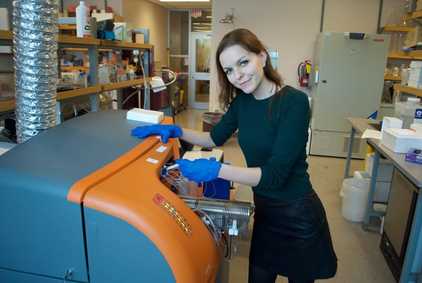Melina Messing

Research summary:
Amyotrophic lateral sclerosis (ALS) is a devastating neurodegenerative disease with neither a known cause nor an available cure. It has been shown that the up or down regulation of different circulating bone marrow-derived inflammatory cells displaying different surface markers separates patient from control samples and identifies different levels of severity. My research focuses on the use of CyTOF that allows for the detection of up to 38 protein markers per cell, to analyze ALS patient and control blood samples in order to identify inflammatory cell subsets at different stages of disease progression. The establishment of a correlation between cell ‘signatures’ and disease stage will be the basis to establish if changes in the inflammatory profile represents an effect or a cause of ALS. This in turn has the potential to open the doors for either a cheap and fast diagnostic tool or the identification of targets for therapeutic treatments.
Personal summary:
Originally from Germany, I came to Canada for my Bachelor degree, which I received in 2015 from the University of Victoria in Biology and Computer Science. I moved to Sweden to start my Master degree at Lund University which I am now finishing with a one year project in the Rossi lab.
Outside of the lab, I primarily enjoy being a musician. I join the local orchestra as a cellist wherever I live and here I am part of the Vancouver Philharmonic Orchestra where we play a wide range of classical repertoire.
Amyotrophic lateral sclerosis (ALS) is a devastating neurodegenerative disease with neither a known cause nor an available cure. It has been shown that the up or down regulation of different circulating bone marrow-derived inflammatory cells displaying different surface markers separates patient from control samples and identifies different levels of severity. My research focuses on the use of CyTOF that allows for the detection of up to 38 protein markers per cell, to analyze ALS patient and control blood samples in order to identify inflammatory cell subsets at different stages of disease progression. The establishment of a correlation between cell ‘signatures’ and disease stage will be the basis to establish if changes in the inflammatory profile represents an effect or a cause of ALS. This in turn has the potential to open the doors for either a cheap and fast diagnostic tool or the identification of targets for therapeutic treatments.
Personal summary:
Originally from Germany, I came to Canada for my Bachelor degree, which I received in 2015 from the University of Victoria in Biology and Computer Science. I moved to Sweden to start my Master degree at Lund University which I am now finishing with a one year project in the Rossi lab.
Outside of the lab, I primarily enjoy being a musician. I join the local orchestra as a cellist wherever I live and here I am part of the Vancouver Philharmonic Orchestra where we play a wide range of classical repertoire.

